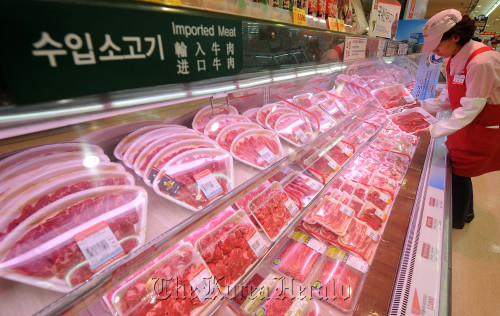Retailers halt U.S. beef sales after BSE outbreak
By Korea HeraldPublished : April 25, 2012 - 19:49
The nation’s large retailers, such as Homeplus and Lotte Mart, temporarily suspended sales of U.S. beef on Wednesday following an outbreak of mad cow disease in California.

The suspension came a day after the U.S. Department of Agriculture reported the country’s fourth-ever case of bovine spongiform encephalopathy, or BSE.
But U.S. officials said it was contained and no contaminated meat had entered the food chain, stressing that it poses no threat to consumers.
A spokesperson for Korea’s Ministry of Food, Agriculture, Forestry and Fisheries said it will see whether to take necessary emergency measures.
He added that the ministry is looking at different options, including a possible halt of customs clearance on beefs from the United States to mitigate public worries over the matter. The suspension would eventually lead to stockpiling U.S. beef that had already been imported, and banning market distribution.
The ministry, for now, is gathering as much information as it can on the situation, including from U.S. health authorities, the spokesperson added.
Homeplus said in a statement that it would temporary discontinue sales of the beef at its retail chains across the country. It said U.S. meat accounts for 15 percent of the total sales, following Australia’s 25 percent and Korean beef’s 60 percent.
A spokesperson for Lotte Mart said it has also decided to suspend U.S. beef sales, and will re-sell them to the public only after the government says that they are safe.
A new case of mad cow disease was discovered in California by the U.S. authorities, rekindling public concern in Korea where it banned U.S. imports in 2003. Korea suspended all in-bound shipments from the U.S. following the BSE detection then, and eased the ban in 2008 as a pre-requisite for establishing a free trade deal between the two countries.
Currently, Korea only imports beef cattle less than 30 months old with the most risky parts removed during the butchery stage.
Mindful of this, beef that had been distributed in Korea has “no connection with” the latest BSE case in the U.S., Korea’s Food Ministry said in a press release.
U.S. authorities also noted that the BSE found in California did not affect its food supply.
There have been four cases of mad cow disease in the U.S. since 2003.
It normally takes 40 to 50 days for imported beef to reach display shelves at retail supermarkets in Korea from the U.S.
Korea imported 107,000 tons or $563 million worth of U.S. beef last year, accounting for 37 percent of the total, according to the Food Ministry.
By Park Hyong-ki (hkp@heraldcorp.com)
-
Articles by Korea Herald







![[Graphic News] More Koreans say they plan long-distance trips this year](http://res.heraldm.com/phpwas/restmb_idxmake.php?idx=644&simg=/content/image/2024/04/17/20240417050828_0.gif&u=)
![[KH Explains] Hyundai's full hybrid edge to pay off amid slow transition to pure EVs](http://res.heraldm.com/phpwas/restmb_idxmake.php?idx=644&simg=/content/image/2024/04/18/20240418050645_0.jpg&u=20240419100350)






![[From the Scene] Monks, Buddhists hail return of remains of Buddhas](http://res.heraldm.com/phpwas/restmb_idxmake.php?idx=652&simg=/content/image/2024/04/19/20240419050617_0.jpg&u=20240419175937)

![[KH Explains] Hyundai's full hybrid edge to pay off amid slow transition to pure EVs](http://res.heraldm.com/phpwas/restmb_idxmake.php?idx=652&simg=/content/image/2024/04/18/20240418050645_0.jpg&u=20240419100350)

![[Today’s K-pop] Illit drops debut single remix](http://res.heraldm.com/phpwas/restmb_idxmake.php?idx=642&simg=/content/image/2024/04/19/20240419050612_0.jpg&u=)